Ella, she/her. Sideblog of @strickvampir. My personal collection of all sorts of useful or funny stuff while I exploring the Chinese (HSK2) and Korean (Level1) language: vocabulary, phrases, anecdotes or only nice to knows. 🗣 🇩🇪 🇬🇧
Don't wanna be here? Send us removal request.
Text

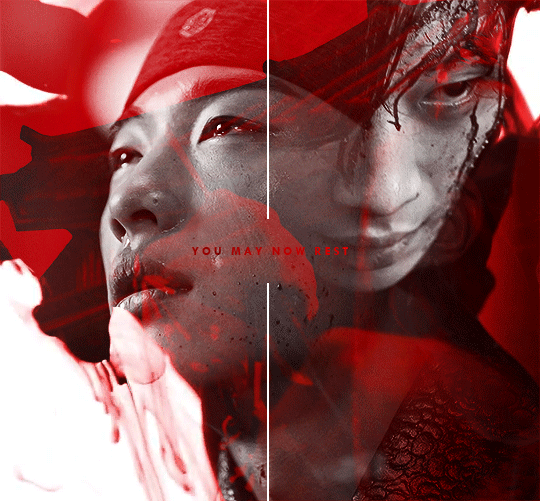

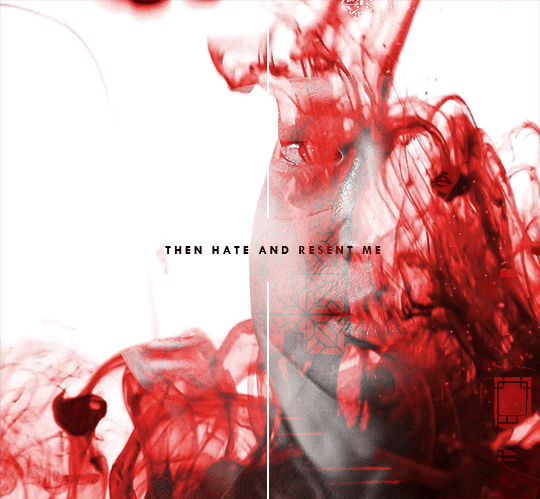

@userdramas 2023 secret santa for @deokmis 🎅🎁💙 | @userdramas get to know me bingo: free space | @asiandramanet creator bingo: blending
YI BANG WON + villain (ft. nam seon ho & seo hwi)
the blood i shed for you has seeped into my skin like tattoo ink.
131 notes
·
View notes
Text
DIY Chinese penis euphemisms ft. Jingsu
Let’s make some penises in Chinese.
Because there are relatively few characters in Chinese (around 20k in a modern dictionary) compared to the number of words in other languages (100k+ in English), most characters carry many meanings. This leads to ambiguities if writing were to be fully composed from single-character words, which is why most words in modern Chinese are compounded from two or more characters, and the meaning is synthesized from the individual meanings. Here are some penis-relevant suffixes, in no particular order:
-物 thing
-器 organ/instrument
-根 root
-茎 stalk
-棒 stick
-柱 pillar
-具 implement
-刃 blade (ouch)
You’ll notice that these are all, well, things. This is one typical pattern for making a Chinese compound word: the second character describes the physicality in some way while the first describes an attribute (characters are flexible and can be either prefix or suffix depending on context). Here are some penis-relevant prefixes:
巨- huge (the opposite would be 微 for tiny, but it’s hard to find micropenises in erotica)
硬- hard
阴- yin
阳- yang
性- sex
那- that
玉- jade
肉- meat
凶- violent
男- male
Now we can create our own penis euphemism by mashing any two together. Here are some real quotes from explicit Jingsu fanfic (translations are kept literal here, but I almost always translate every euphemism to cock because it’s the English term I hate the least):
阳具 = yang implement
萧景琰的阳具大得惊人,比一般的乾阳还要大上几分,他曾笑说这是皇家威严,被梅长苏白了一眼 [x]
Xiao Jingyan’s yang implement was frighteningly large, even significantly larger than the average Alpha’s. He once joked that this was the might of the imperial bloodline, getting an eye roll from Mei Changsu.
凶刃 = violent blade
只是等到下一个清醒的瞬间,萧景琰已经将他的双腿分开。将那粗硬滚烫的凶刃抵上濡湿的穴口。《踏雪寻梅》
But the next instant he came to, Xiao Jingyan had already parted his legs. Pressed that thick, hard, and searing violent blade against his wet opening.
性器 = sex organ
萧景琰的囊口已经完全开了,里头两根性器探了出来,打在林殊大腿外侧 《四时歌》
Xiao Jingyan’s sac had fully opened, two sex organs emerging from inside and hitting against the outside of Lin Shu’s thigh.
肉棒 = meat stick
他一定不知道自己被黑布蒙住双眼,仰着头费力吞吐男人肉棒的模样有多……诱惑 [x]
He must not know how…seductive he looks, black cloth covering both eyes, tilting his head to strenuously swallow a man’s meat stick.
那物 = that thing
萧景琰也不再磨蹭,随手抓过床边的消毒啫喱,在自己的那物上涂了几下便抵在了长苏紧闭的穴口 [x]
Xiao Jingyan didn’t waste any more time either, grabbing the disinfectant gel conveniently by the bedside, applying it a few times on that thing of his then pressing it against Changsu’s tight opening.
The anatomical term for the penis is 阴茎 = yin stalk, the word that is the closest equivalent of penis. But why is the penis both a yin stalk and yang implement? Glad you asked. Yang is associated with the male and yin with the female, but the very concept of yin-yang is that there’s yin in yang and yang in yin (think of the symbol itself). The penis is a yin part because the privates are the most yin on the body. So you can think of it as either the thing of a yang being, or the yin thing on a yang being—the wonderful duality of the male member.
As you might expect, not all of the possible combinations are actually in use. Like, 阴棒 = yin stick isn’t a thing. Why not? I don’t know, it just isn’t. If you used it in context, readers would understand you mean penis and probably puzzle a bit over why you didn’t use the more common names.
Some of the combinations also mean other things. 凶器 = violent instrument actually means murder weapon in ordinary use. Can it be a penis euphemism during rough sex? Yes, but most of the time it means the real weapon. 那根 = that root is tricky because 根 is a classifier word (a similar concept to measure words in English) for long stick-like objects in addition to its meaning of root, so 那根 is almost always used in conjunction with other words, like that phallic [thing], as opposed to a penis on its own, which would probably be confusing to read. But when the character preceding 根 is something else, like 男- male, then it’s not being used in the classifier context, and 男根 = male root is indeed a penis.
Now that we’ve gotten the explanations out of the way, I searched through the corpus of Chinese Jingsu fics on my computer (around 1000+ fics) to look for all possible combinations of the prefixes and suffixes listed above, tossing out the compound words that don’t mean penis in context, to see what the most popular penises are. Behold the Jingsu compound penis matrix:
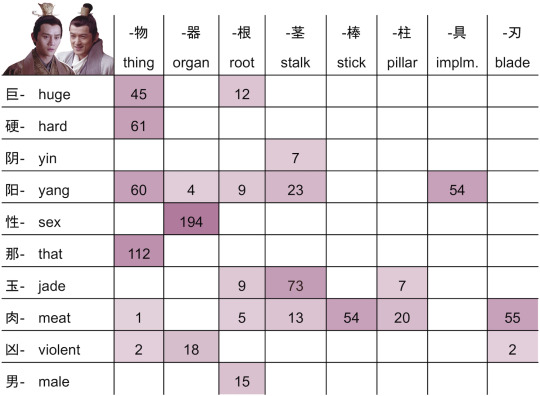
Congratulations to our winner, sex organ, and the distant runner-up, that thing. In contrast, the anatomical yin stalk is not very popular, kind of like how penis is not used as frequently as other terms in English erotica.
Okay, so now you have the power to create all kinds of penises. But what’s the correct penis to use in a particular situation? Jingsu smut is, of course, mostly ancient erotica (unless it’s a modern AU), so the tendency is to go for the more literary and euphemistic, and the way to do that is to be less physically descriptive. That thing is definitely more suited for delicate company than meat stick (though some authors happily use meat stick in their ancient settings anyways), and jade/yin/yang penises are also more literary. 玉茎 = jade stalk is, in fact, the traditional Chinese medicine term for the penis and also a literary term, in use for well over a thousand years.
萧景琰取了红帛将梅长苏的玉茎捆扎起来,被白肤衬起来耀眼得很。《梅烬》
Xiao Jingyan tied up Mei Changsu’s jade stalk with red silk, looking quite eye-catching against white skin.
Some more penises
It would be way oversimplifying things to say we’re done now when there are many more methods to form words and penises in Chinese besides our simple algorithm. Let’s first discuss some concepts with English analogs:
A lot of ancient cultures associated chickens with the male member, and we have cock in English. In Chinese, children call penises 小鸡鸡 = little chicken, kind of the equivalent of weewee. You would definitely not use it in a sexy story.
In English you could say he pushed himself inside, and you could say that in Chinese too, with 自己 = self. A relatively euphemistic term.
There’s also little [person’s name], so 小长苏 = xiao-Changsu and 小景琰 = xiao-Jingyan exist. And yes, so does 小小殊 = xiao-xiao-Shu, Lin Shu’s penis. This might be my least favorite one. These are not generally euphemisms you’d see in more…well-regarded erotica.
Okay, now onto the more uniquely Chinese penises. We have some more euphemistic ones:
那话儿 = those words, actually meaning that which we can’t speak of, and penis. 话儿 on its own just means words and remarks in general, but once you add that in the beginning, it becomes a whole other thing (though it can still mean those words in non-erotic contexts). This is one of the euphemisms found in the infamous erotic Ming Dynasty novel 金瓶梅 (Jīn Píng Méi), The Plum in the Golden Vase, so it has a storied history, though it isn’t used much in Jingsu smut at all. 不文之物 = uncivilized thing is also along these lines (之 here is a literary possessive particle). You can also put all kinds of adjectives before 之物 for a more customized penis.
Speaking of adjectives, one thing about Chinese very different from English is that parts of speech are fluid, especially in Classical Chinese where many characters are basically any part of speech. 火热 is fire + hot, but it can be both an adjective, fiery hot, that you stick in front of a penis, or a noun, fiery heat, that acts as a penis itself. So 火热之物, fiery hot thing, is a penis, and here’s an example where just fiery heat is the penis:
他稍顿了顿,便继续往里推进,里面温暖紧致,肠道吸附在他的火热上,就好像他们天生就是一套的,此刻终于镶嵌完整了 《夜宿山寺》
He paused slightly, then continued pushing inward. The passage is warm and tight inside, clinging onto his fiery heat as if they were two pieces made for each other, finally tessellating together and becoming whole in this moment.
We also have words with standard definitions that mean something else in erotica:
尘根 = dust root, which is actually a term in Buddhism that means one of the human senses rooting you to the mortal realm, often referred to as the realm of ephemeral dust (尘世). This is a creative allusion, because what else is a penis but a root that traps you in carnal desire and prevents you from reaching nirvana? Of course, whether it’s appropriate for use depends on whether you want to bring up mortality and the illusion of desire when your characters are getting it on. 孽根 = sinful root, or the more fun translation, root of evil, is also along these lines.
只是这么一想,萧景琰压根还没被触碰到的尘根就一颤一颤的立了起来,硬邦邦地将单薄的亵裤撑起一片帐篷 [x]
At this mere thought, Xiao Jingyan’s utterly untouched dust root trembled upwards, forming a stiff tent in his thin underclothes.
命根 = life root, meaning the source of vitality or reason for living, which is obviously the penis. This one does refer to penis in ordinary use as well, often humorously.
他的命根子给萧景琰含着,用力吮裹,几乎要把他的魂从身体里吸出来一样。[x]
His life root was held in Xiao Jingyan’s mouth and forcefully sucked, as if threatening to extract his soul from his body.
欲望 = desire. Very popular in erotica, not in the dictionary as a penis, and may confuse a first-time fic reader why an abstract concept is being shoved places.
萧景琰握住梅长苏纤长的双腿,让他缠在自己腰上,把快要忍爆了的欲望抵在那小小的入口,慢慢地推了进去 [x]
Xiao Jingyan gripped Mei Changsu’s slender legs, letting him wrap around his own waist, and pressed his desire, nearly exploding with need, against that tiny opening, slowly pushing in.
分身 = split body, or where the body parts (and what you do with it to another body). Its usual meaning is to find time to do something else, and this meaning is only for erotica.
At this point, I should say that some of these may have been invented for erotica to get around censorship. The coined words often evolve to become part of the vocabulary of the in-group over time, such that even when there’s no need to censor, people instinctively use the vocabulary to signal, whether subconsciously or consciously, that they’re in the know.
Of course, just because a euphemism is popular, or of proper ancient lineage, doesn’t mean it will be subjectively to your taste. Jade stalk burns my eyes despite being a classic literary term, which probably says more about my Chinese than anything else; someone who’s really internalized this term and isn’t still on the literal level of understanding probably doesn’t mind it at all. Honestly, my original intention was to giggle a bit at all the euphemisms, but now that I’ve stared at them for a while, they all seem…okay to me (except xiao-xiao-Shu, that one can die). Not sure whether that’s a good thing or not.
A bonus last one very relevant to Jingsu, 龙根 = dragon root, just for His Majesty’s penis.
萧景琰的龙根还埋在自己体内,下体湿滑粘腻,一片狼藉,胸前的两点又被肆意玩弄,梅长苏真想就这么昏过去算了。[x]
Xiao Jingyan’s dragon root was still buried inside him, his lower body slick and wet, a completely sorry mess, and the two nubs on his chest were being wantonly toyed with again—Mei Changsu really wished he could just pass out on the spot and be done with it.
Here’s a penis alignment chart that is almost, but not quite, entirely unlike a summary of our findings:
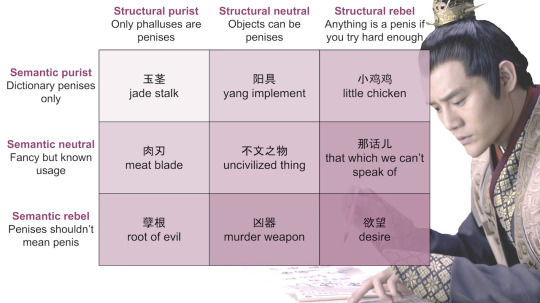
What if I don’t want to make penises?
As you’ve seen so far, Chinese is very good for euphemisms, and you can write the dirtiest smut without mentioning any parts once.
My favorite Jingsu sex euphemism is easily 梅开二度, literally plum blossoms bloom for the second time, which is an idiom meaning reaching the pinnacle again. It’s frequently used to describe a footballer scoring the second goal in a single match, someone finding new love after a failed relationship, or yes, orgasming for the second time in one night. But in the Jingsu context, it can also be literally read as…Mei Changsu “opens” for the second time.
I would write another post on euphemisms for other body parts and sex in general (including the inexplicably many sex puns in NiF canon names), but this euphemism is clearly the pinnacle, and I will not reach it again.
3K notes
·
View notes
Text
Days of the week (Part I)

Days of the week/Wochentage/Jours de la semaine/Tagoj de la semaino
20 notes
·
View notes
Text
les signes de ponctuation en fraçais
le point - period (🇺🇸) full stop (🇬🇧) [ . ]
la virgule - comma [ , ]
le point-virgule - semicolon [ ; ]
les deux points - colon [ : ]
Les trois points de suspension- ellipsis [ ... ]
le point d'interrogation- question mark [ ? ]
le point d'exclamation - exclamation mark [ ! ]
l'apostrophe (f) - apostrophe [ ' ]
les guillemets - guillemets [ « » ] (En anglais, on n’emploie jamais de guillemet français)
les guillemets anglais/les guillemets en apostrophe - quotation mark [ " " ] (🇺🇸) [ ' ' ] (🇬🇧) rarely/never used in French
les parenthèses - parenthesis [ ( ) ]
les crochets - brackets [ [ ] ]
les acolades - curly brackets/braces [ { } ]
le tiret - dash [ - ]
le tiret long/tiret cadratin - em dash [ — ]
la barre oblique/le slash - slash [ / ]
la barre oblique inversée/ le backslash - backslash [ \ ]
l'esperluette (f) - ampersand [ & ]
l'arobase - at sign [ @ ]
l'astérisque - asterisk [ * ]

463 notes
·
View notes
Text

#learning languages#learning chinese#learning korean#learning japanese#esperanto#learning french#langblr#multilingual
64 notes
·
View notes
Text
Chinese Verbs Cheat sheet: B's
My quick guide to the most common B- verbs in Chinese!
Bake - 烘烤 - hōng kǎo
Be - 是 - shì
Belong to - 属于 - shǔyú
Begin - 开始 - kāishǐ
Believe - 相信 - xiāngxìn
Become/ turn into - 成为 - chéngwéi
Boil - 煮熟 - zhǔ shú
Blame - 责备 - zébèi
Break - 打破 - dǎp��
Bring - 带来 - dàilái
Build - 建造 - jiànzào
Burn - 烧 - shāo
Buy - 买 - mǎi
161 notes
·
View notes
Text
I just found out the japanese for "cookie cutter" is クッキー型(kukkī kata). The kanji used here, 型 (kata) means "shape" or "form", and seems to come from an older word, 型抜き/抜き型 (shaped cutter/punch), which means that 型 is completely unrelated to "cutter" etymologically (a false cognate). It's just a coincidence that クッキー型 sounds almost identical to "cookie cutter"!
It's like that crazy case of the english word "dog" and the Mbabaram word "dog" having the exact same meaning and almost identical pronunciation by complete coincidence.

477 notes
·
View notes
Text

https://linktr.ee/purrinink 🐈⬛🖤
1K notes
·
View notes
Text
The Spanish Accent Rule
Knowing when and where to place an accent on a word in Spanish can be difficult. Did you know there’s a rule that can help.
All words in Spanish are assigned one of three categories based on the last three syllables of the word.
If the last syllable is the stressed one:
-and it ends with a vowel or a vowel followed by a “n” or “s” it will have an accent. (This is called agudas)
For example:
Take the word holandés
Break it into its syllables: ho-lan-dés
The stressed syllable is the last one and it ends in an “s” so it has an accent.
A second example of agudas is the word mandar. It has two syllables: man-dar and the last syllable is the stressed one. Since the word ends with “r” it doesn’t have an accent.
If the penultimate syllable is the stressed one:
-and it ends in a consonant other than “n” or “s” (OR if the “s” follows a consonant) it will have an accent. (This is called llanas)
For example, the word álbum is in the llanas group and since its last letter is “m” it has an accent on its stressed syllable, therefore, álbum.
A second example is bíceps, (also part of the llanas group) and its last two letters are “ps” therefore it has an accent on its stressed syllable, hence bíceps.
One last example is abanico. The stressed syllable is “ni” but the word ends in a vowel so it does not have an accent.
If the third from last syllable is the stressed one:
-then it will always have an accent. (This is called esdrújulas)
For example the word música is esdrújula so it has an accent on its stressed syllable making it música.
126 notes
·
View notes
Text
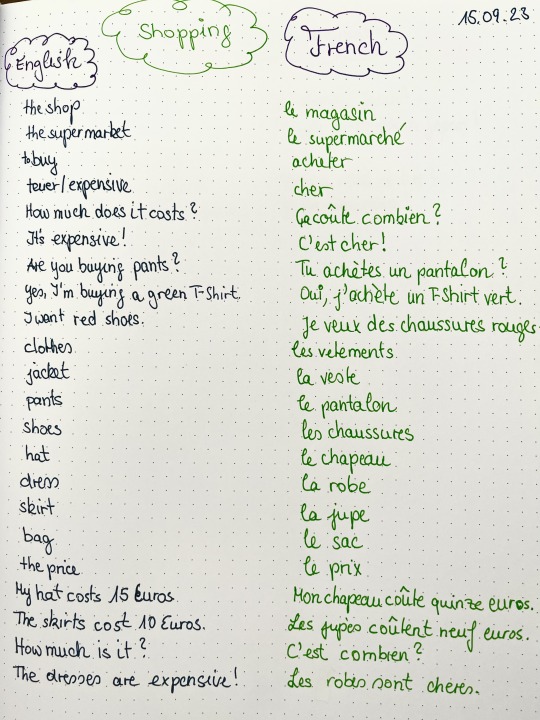
J'ai fait quelques exercices de français aujourd'hui.
I did a few exercises in French today. 😊👍🏽
6 notes
·
View notes
Text
My new favourite idiom is 画蛇添足 basically meaning to ruin something by overdoing it
Quite literally ‘draw snake add feet’
Pinyin: Huàshé tiānzú
Traditional: 畫蛇添足
15K notes
·
View notes
Text
Phrase of the day:
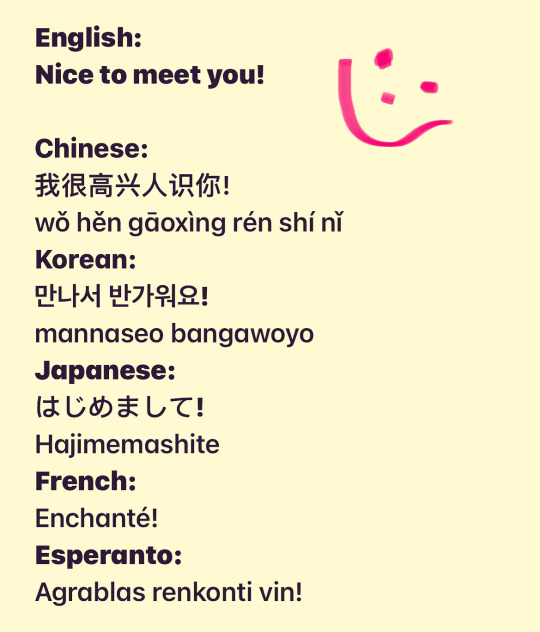
53 notes
·
View notes
Text
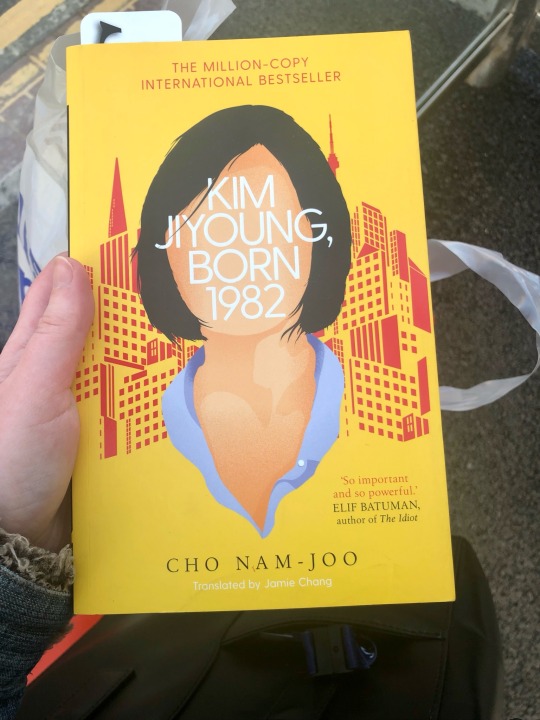
Next read ‘Kim Jiyoung, Born 1982’ by Cho Nam-Joo now.
#one of the best books that I had read in 2023#recommended#korean author#south korea#cho nam joo#strong women
19 notes
·
View notes
Photo
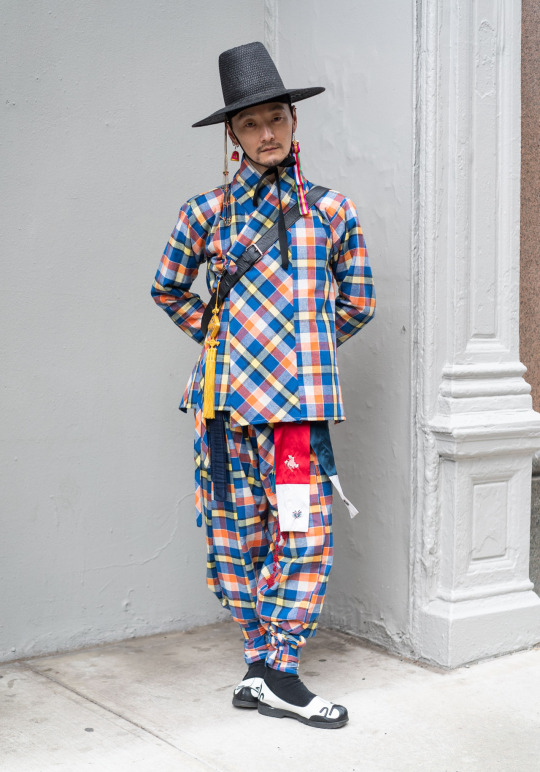
Yang, 36
“I’m wearing my own creations as I am Hanbok (traditional Korean clothing) tailor: traditional pattern Jeogori (top) and Baji (pants) in modern fabrics with traditional Korean shoes, tassels and ornaments called Norigae and Goreum and a modern version of the traditional Korean hat called a Ga. My outfit is inspired by 1840s European fashion pattern mixing.”
Apr 9, 2022 ∙ Chelsea
7K notes
·
View notes
Text
Multilingual playlist in 450 languages
Through this video, I recently discovered a multilingual playlist in more than 400 languages that I wanted to share. It contains many genres as well, from rap to ballads and everything in between.
Here are all the languages featured:
In bold, the country which the artist is from, if the language is spoken in more than one.
Aga Who by Namibian Tales - ǃKung (Angola, Botswana, Namibia, and South Africa)
Абыгъь гIавжьква by Султан Лагучев - Abaza (Russia)
Сан by Хибла Мукба - Abkhaz (Georgia)
Kutidhieng by Liza Aulia - Acehnese (Indonesia)
Makambo by Geoffrey Oryema - Acholi (South Sudan and Uganda)
Адыгагъэ by Адлер Коцба and Батыр Долев - Adyghe (Russia)
Aamin Ciidaada by Fatouma Haroun Helem, Abdi Sho Ahmed, Ibrahim Mahamoda, Habone Ahmed Ali, Abdo Lalee, Saad Said Omar, and Gesood Abdo Ismail - Afar (Djibouti, Eritrea, and Ethiopia), Amharic (Ethiopia), Arabic (Algeria, Bahrain, Comoros, Djibouti, Egypt, Iraq, Jordan, Kuwait, Lebanon, Libya, Mauritania, Morocco, Oman, Palestine, Qatar, Saudi Arabia, Somalia, Sudan, Syria, Tunisia, United Arab Emirates, and Yemen), French (Belgium, Benin, Burkina Faso, Burundi, Cameroon, Canada, Central African Republic, Chad, Comoros, Côte d’Ivoire, Democratic Republic of the Congo, Djibouti, Equatorial Guinea, France, Gabon, Guinea, Haiti, Luxembourg, Madagascar, Mali, Monaco, Niger, Republic of the Congo, Rwanda, Senegal, Seychelles, Switzerland, Togo, and Vanuatu), Oromo (Ethiopia and Kenya), Somali (Djibouti, Ethiopia, and Somalia), and Tigrinya (Eritrea and Ethiopia).
Hou Die Hemel Oop by Riana Nel - Afrikaans (Namibia and South Africa)
Battaki by IMERUAT - (Hokkaido) Ainu (Japan)
He Eh Lalla by Ifriqiyya Electrique - Djerbi (Tunisia)
Mansa by Bisa Kdei - Akan (Ghana)
Lejla by Elvana Gjata ft. Capital T and 2PO2 - Albanian (Albania, Greece, Italy, Kosovo, Montenegro, North Macedonia, Serbia, and Turkey)
Torol Jerim by Mergen Teldenov - Altai (Russia)
I God Mo Hango Mai Kita by Vanessa Quai ft. New Breeds - Ambae (Vanuatu)
ገርዬ (Gereye) by ቤቲ ጂ (Betty G) - Amharic (Ethiopia)
【Aka pisawad】不要放棄 by Suming 舒米恩 - Amis (Taiwan)
Ngarrikwujeyinama by Emily Wurramara - Anindilyakwa (Australia)
Prayers In a Song by Tall Paul - Anishinaabemowin/Ojibwe (Canada and United States)
Ké sa lévé by Kassav’ - Antillean Creole (Dominica, France, Grenada, Saint Vincent and the Grenadines, Saint Lucia, and Trinidad and Tobago)
Zongza by Run Monday Run - Ao (India)
سكرو الشبابيك (Sakru Chababîk) by Racha Rizk رشا رزق - (Classical) Arabic (Algeria, Bahrain, Comoros, Djibouti, Egypt, Iraq, Jordan, Kuwait, Lebanon, Libya, Mauritania, Morocco, Oman, Palestine, Qatar, Saudi Arabia, Somalia, Sudan, Syria, Tunisia, United Arab Emirates, and Yemen)
Taragalte by Oum - (Darija) Arabic (Algeria, Bahrain, Comoros, Djibouti, Egypt, Iraq, Jordan, Kuwait, Lebanon, Libya, Mauritania, Morocco, Oman, Palestine, Qatar, Saudi Arabia, Somalia, Sudan, Syria, Tunisia, United Arab Emirates, and Yemen)
كان لك معايا (Kan Lak Ma’aya) by Cairokee كايروكي - (Egyptian) Arabic (Algeria, Bahrain, Comoros, Djibouti, Egypt, Iraq, Jordan, Kuwait, Lebanon, Libya, Mauritania, Morocco, Oman, Palestine, Qatar, Saudi Arabia, Somalia, Sudan, Syria, Tunisia, United Arab Emirates, and Yemen)
Na Sane by Noura Mint Seymali - (Hassaniya) Arabic (Algeria, Bahrain, Comoros, Djibouti, Egypt, Iraq, Jordan, Kuwait, Lebanon, Libya, Mauritania, Morocco, Oman, Palestine, Qatar, Saudi Arabia, Somalia, Sudan, Syria, Tunisia, United Arab Emirates, and Yemen)
دبَل الدعسة by أنا.نحن ana.n7n - (Hejazi) Arabic (Algeria, Bahrain, Comoros, Djibouti, Egypt, Iraq, Jordan, Kuwait, Lebanon, Libya, Mauritania, Morocco, Oman, Palestine, Qatar, Saudi Arabia, Somalia, Sudan, Syria, Tunisia, United Arab Emirates, and Yemen)
Baladeyati by The Synaptik x Shorbagy السينابتيك بلدياتي مع شربجي - (Jordanian) Arabic (Algeria, Bahrain, Comoros, Djibouti, Egypt, Iraq, Jordan, Kuwait, Lebanon, Libya, Mauritania, Morocco, Oman, Palestine, Qatar, Saudi Arabia, Somalia, Sudan, Syria, Tunisia, United Arab Emirates, and Yemen)
كرهني (Krahni) by Elissa كرهني - (Lebanese) Arabic (Algeria, Bahrain, Comoros, Djibouti, Egypt, Iraq, Jordan, Kuwait, Lebanon, Libya, Mauritania, Morocco, Oman, Palestine, Qatar, Saudi Arabia, Somalia, Sudan, Syria, Tunisia, United Arab Emirates, and Yemen)
ايمتى نجوزك يما (Emta Njawzak Yamma) by DAM - (Palestinian) Arabic (Algeria, Bahrain, Comoros, Djibouti, Egypt, Iraq, Jordan, Kuwait, Lebanon, Libya, Mauritania, Morocco, Oman, Palestine, Qatar, Saudi Arabia, Somalia, Sudan, Syria, Tunisia, United Arab Emirates, and Yemen)
زمّلوا (Zamilou) by Bu Kolthoum بو كلثوم - (Syrian) Arabic (Algeria, Bahrain, Comoros, Djibouti, Egypt, Iraq, Jordan, Kuwait, Lebanon, Libya, Mauritania, Morocco, Oman, Palestine, Qatar, Saudi Arabia, Somalia, Sudan, Syria, Tunisia, United Arab Emirates, and Yemen)
دنيا الدور (Denia Dour) by Ÿuma - (Tunisian) Arabic (Algeria, Bahrain, Comoros, Djibouti, Egypt, Iraq, Jordan, Kuwait, Lebanon, Libya, Mauritania, Morocco, Oman, Palestine, Qatar, Saudi Arabia, Somalia, Sudan, Syria, Tunisia, United Arab Emirates, and Yemen)
Satisfaction by Yemen Blues ft. Oxmo Puccino - (Yemeni) Arabic (Algeria, Bahrain, Comoros, Djibouti, Egypt, Iraq, Jordan, Kuwait, Lebanon, Libya, Mauritania, Morocco, Oman, Palestine, Qatar, Saudi Arabia, Somalia, Sudan, Syria, Tunisia, United Arab Emirates, and Yemen)
Corre by Ixeya - Aragonese (Spain)
Յարխուշտա (Yarkhushta) by Sevak Amroyan - Armenian (Armenia and Artsakh)
Luna alba by Elena Gheorghe - Aromanian (Albania, Bulgaria, Greece, North Macedonia, Romania, and Serbia)
Nakhyatra by Abhi Saikia ft. Shankuraj Konwar - Assamese (India)
Barda by Rayan Zaito - Assyrian Neo-Aramaic (Iran, Iraq, Syria, and Turkey)
L’Estrueldu by Desakato - Asturian (Spain)
喜歡 (Sawyal) by Yawai Mawlin 雅維·茉芮 - Atayal (Taiwan)
Moteskano by Layra Niquay - Atikamekw (Canada)
Drangkinbala by Blekbala Mujik - Australian Kriol (Australia)
Horol Ebel by Oyme - Avar (Azerbaijan and Russia)
Ambwa Talay by Javed Bashir and Humera Channa - Hindustani (India and Pakistan)
Ukhamampi Munataxa by Los Kjarkas - Aymara (Bolivia, Chile, and Peru)
Sənlə olmaz ki by Nazryn - Azerbaijani (Azerbaijan, Georgia, Iran, Iraq, Russia, and Turkey)
Fungao ae koro tido na by Abidan x Erick - Baeggu (Solomon Islands)
Kopolo by Orchestre Baka Gbiné - Baka (Cameroon, Central African Republic, and Gabon)
هفت (Laal) by Haft - Balochi (Afghanistan, Iran, and Pakistan)
Kamelemba by Oumou Sangaré - Bambara (Mali)
Nanang Galuh Banjar by JEF Banjar - Banjarese (Indonesia)
Nagniouma by Josey - Baoulé (Côte d’Ivoire)
Ngwa by Blick Bassy - Basaa (Cameroon)
Уфтанма by Elvin Grey - Bashkir (Russia)
Lasai, lasai by Huntza - Basque (France and Spain)
Sukkun Ma Dirim by Dorman Manik - Batak (Indonesia)
Autobahn by LaBrassBanda - Bavarian (Austria, Italy, and Germany)
Небяспечна by Nizkiz - Belarusian (Belarus)
Mama by Esther Chungu - Bemba (Democratic Republic of the Congo, Tanzania, and Zambia)
Ta Jani Na by Minar Rahman - Bengali (Bangladesh and India)
Palea by Dobet Gnahoré - Bété (Côte d’Ivoire, Ghana, Liberia, and Nigeria)
Dadi Chumavahu by Sharda Sinha - Bhojpuri (India and Nepal)
Mauli by Fred Engay and Mei Teves - Bikol (Philippines)
Mi free by Atara Singers - Bislama (Vanuatu)
Hme ye by Hawa Boussim - Bissa (Burkina Faso and Ghana)
Dakha by Thorthingo - Boro (India)
Pandora by Božo Vrećo ft. Marko Louis - Bosnian (Bosnia and Herzegovina)
Da Yakh Da Barfak by Qadir Channal Zehri - Brahui (Afghanistan, Iran, Pakistan, and Turkmenistan)
Tri Martolod by Nolwenn Leroy - Breton (France)
Puadai Pappoji Ko Mappojiki by Selfi Yamma - Buginese (Indonesia)
Песента на тишината by Авеню - Bulgarian (Albania, Bulgaria, Greece, Moldova, North Macedonia, Romania, Serbia, Turkey, and Ukraine)
Monboulae by Patricia Essong - Bulu (Cameroon)
從此刻起 (Paiska laupaku) by Bunun 布農人 - Bunun (Taiwan)
Diyama by Ripple Effect Band - Burarra (Australia)
Starry Night by Big Bag - Burmese (Bangladesh, India, and Myanmar)
Amlal by Wakka - Buryat (China, Mongolia, and Russia)
Orobroy Vs by Dorantes - Caló (France, Portugal, and Spain)
My Baby by Missy Bk ft. Annie Anzouer - Cameroonian Pidgin English (Cameroon)
Bersu d’Oru by Elida Almeida - Cape Verdean Creole (Cape Verde)
Teleapàtic by Minova - Catalan (France and Spain)
Ipanumpa ko by Oh! Caraga - Cebuano (Philippines)
Tiene Duenyo by cheeze de sal - Chavacano (Phillipines)
Magåhet by Joe Guam ft. Jacquelyn - Chamorro (United States)
Безаман алу by Марха Макаева - Chechen (Russia)
The Whippoorwill by Walela - Cherokee (United States)
Mor Sansaar by Rishraj Pandey and Shweta Mahima Das - Chhattisgarhi (India)
Hear Me by The Very Best - Chewa (Malawi, Mozambique, Zambia, and Zimbabwe)
染色體 by 卡式帶樂團 Casette - (Cantonese) Chinese (China)
社會現象 Social Phenomenon by 黃宇寒 Han - (Hakka) Chinese (China and Taiwan)
勇敢 Braveness by 五月天 Mayday - (Taiwanese Mandarin) Chinese (Taiwan)
山每 Wayfarer by 草東沒有派對 No Party For Cao Dong - (Taiwanese Mandarin) Chinese (Taiwan)
Side E Jaa by Raafky - Chittagonian (Bangladesh)
O Rhosi by Tetseo Sisters ft. United for Dance - Chokri (India)
Hoyo Hoyo by Selma Uamusse - Chopi (Mozambique)
la Pasik by Ozeky - Chuukese (Micronesia)
Юратушка by Полина Борисова - Chuvash (Russia)
Anyibu by Cheikh MC - Comorian (Comoros)
Eus Keus? by Gwenno - Cornish (United Kingdom)
Sognu by Amaury Vassili - Corsican (France and Italy)
Oti Nikan by Asani - (Woods) Cree (Canada and United States)
Unutmasan by Jamala - Crimean Tatar (Belarus, Bulgaria, Kyrgyzstan, Lithuania, Poland, Romania, Russia, Turkey, Ukraine, and Uzbekistan)
Domine by Lu Jakelić - Croatian (Bosnia and Herzegovina, Croatia, Montenegro, and Romania)
Cybervuk by Turbokrowodn - (Burgenland) Croatian (Austria, Czech Republic, Hungary, Poland, and Slovakia)
C̆erný anděl by Gabriela Gunčíková - Czech (Czech Republic)
Mumbwe by Tio - Daakaka (Vanuatu)
Den Dejligste Boy by Benjamin Hav - Danish (Denmark and Germany)
Bada Bada by Massi Howaida - Dari Persian (Afghanistan)
Ilé by Fafa Ruffino and Rockin’ Squat - Dendi (Benin)
Falling Stars by Leela Gilday - Denesuline (Canada)
Magey Raajje by Equatic Vibe - Dhivehi (India and Maldives)
Yic Thiek Du by Mike Dee ft. Alijoma - Dinka (South Sudan and Sudan)
Yé ké yé ké by Mory Kanté - Mandinka (Guinea, Guinea-Bissau, Liberia, Senegal and The Gambia)
Pahadaan Di Hoor by Rinku Ji Mansarwale, Sumit Bhalla, and Shumalini Goswami - Dogri (India and Pakistan)
Talon Haut by MidnightGroovers - Dominican Creole French (Dominica)
Nöjeng by Djunya - Drehu (France)
Lange Vinnen by Eefje de Visser - Dutch (Belgium, Netherlands, and Suriname)
Seba Allah by Alpha Blondy abd The Solar System - Dyula (Burkina Faso, Côte d’Ivoire, and Mali)
Doen Dayra by Kenny Lhendup and Pema Deki ft. Nima Dalyang - Dzongkha (Bhutan)
CONDOR PASA by Linaje Originarios - (Chamí) Emberá (Colombia)
Blood of the Fang by Clipping - English (Antigua and Barbuda, Australia, Bahamas, Bahrain, Bangladesh, Barbados, Belize, Bostwana, Brunei, Burundi, Cambodia, Cameroon, Canada, Cyprus, Dominica, Eritrea, Eswatini, Ethiopia, Fiji, Ghana, Grenada, Guyana, India, Ireland, Israel, Jamaica, Jordan, Kenya, Kiribati, Kuwait, Lesotho, Liberia, Malawi, Malaysia, Maldives, Malta, Marshall Islands, Mauritius, Micronesia, Myanmar, Namibia, Nauru, New Zealand, Nigeria, Oman, Pakistan, Palau, Papua New Guinea, Philippines, Qatar, Rwanda, Saint Kitts and Nevis, Saint Lucia, Saint Vincent and the Grenadines, Samoa, Seychelles, Sierra Leone, Singapore, Solomon Islands, South Africa, South Sudan, Sri Lanka, Sudan, Tanzania, The Gambia, Tonga, Trinidad and Tobago, Tuvalu, Uganda, United Arab Emirates, United Kingdom, United States, Vanuatu, Zambia, and Zimbabwe)
Vaya by OYME - Erzya (Russia)
Urba Naturo by i.d.c. ft. Jules Etienne - Esperanto (Brazil, China, France, Germany, Hungary, Japan, United States
Segased Lood by Karl-Erik Taukar - Estonian (Estonia)
Amégan by Afia Mala ft.Toumani Diabaté - Ewe (Benin, Ghana, and Togo)
Botaka by Titoye Bolabote - Fang (Cameroon, Equatorial Guinea, Gabon, Republic of the Congo, and São Tomé and Príncipe)
Farvæl by Danny & the Veetos - Faroese (Denmark)
Mera Maal by Ra V ft. Harsha Harsmeetal - Fiji Hindi (Fiji)
Yadra Mai by InsideOut - Fijian (Fiji)
Hulluuden Highway by Haloo Helsinki! - Finnish (Finland, Norway, Russia, and Sweden)
Zeiler ver van huis by Johan Verminnen - Flemish (Belgium, France, and Netherlands)
Dombolo by Les Amazones d’Afrique ft. Angelique Kidjo - Fon (Benin, Nigeria, and Togo)
Dja Dja Mungû by Mousa Halawi - Forro Creole (São Tomé and Príncipe)
La Tita Eun Vacanse by Le Digourdì - Franco-Provençal (France, Italy, and Switzerland)
Acrobates by L.E.J - French (Belgium, France, Luxembourg, and Switzerland)
Sabine Turnaround by Lost Bayou Ramblers - (Louisiana) French (United States)
Coton ouaté by Bleu Jeans Bleu - (Quebec) France (Canada)
Médité by Valérie Tribord - French Guianese Creole (French Guiana)
Ik meitsje dy dea by De Hûnekop - (West) Frisian (Netherlands)
Cavalot e Cisa by Dek Ill Ceesa - Friulian (Italy)
Sinayawaré by Jy Junelle ft. Isnebo - Fula (Benin, Burkina Faso, Cameroon, Central African Republic, Chad, Ethiopia, Ghana, Guinea, Guinea-Bissau, Mali, Mauritania, Niger, Nigeria, Senegal, Sierra Leone, Somalia, Sudan, The Gambia, and Togo)
Yaathelha Setsotwalha by Agô Ancestralidade - Fulniô (Brazil)
Hederlez by Lüdmila Tukan - Gagauz (Moldova, Russia, Turkey, and Ukraine)
Midas by Tanxugueiras - Galician (Spain)
Ho Delo by Dabid Angu & The Tribe - Galo (India)
LOVE by Mitch Tambo - Gamilaraay (Australia)
Wéndeti Nagaira by Manu Martínez - Garifuna (Belize, Guatemala, Honduras, and Nicaragua)
Hai Chena by NOKPANTE - Garo (Bangladesh and India)
Epona by Eluveitie - Gaulish (France, Italy, and Switzerland)
Mermisi by Bedford Falls - Georgian (Georgia)
Legenden by Max Giesinger - German (Austria, Belgium, Germany, Liechtenstein, Luxembourg, and Switzerland)
Vo Mello bis ge Schoppornou by HMBC - (Vorarlbergian) German (Austria)
Ham kummst by Seiler und Speer - (Bavarian) German (Austria, Germany, and Italy)
Günnen by Die fofftig Penns - Low German (Denmark, Germany, and Netherlands)
Tribut by Lo & Leduc - (Swiss) German (Austria, Italy, Liechtenstein, Switzerland)
Ngke Arona by Elijah L ft. Antoo G - Gilbertese (Kiribati)
Ilima by Msafiri Zawose - Gogo (Tanzania)
SHIRINA by Navid Zardi - Gorani (Iran and Iraq)
Αγάπη Φωτιά by Emigre - Greek (Albania, Cyprus, Greece, and Italy)
Qiimassutissarput Aajuna by Nanook - Greenlandic (Denmark)
Mborayhu Asy by Tekove - Guaraní (Argentina, Bolivia, Brazil, and Paraguay)
Haalyo jaa by Kushal Chokshi and Jaysinh Gadhvi - Gujarati (India and Pakistan)
Ratja Yaliyali by Gawurra - Gupapuyngu/Dhuwal (Australia)
Yil Lull by Joe Geia - Guugu Yimithirr (Australia)
Memwa’n by Moonlight Benjamin - Haitian Creole (Haiti)
Kaala Suit by Pulkit Arora ft. Saurabh Tanwar - Haryanvi (India)
Rai na by DJ Ab, Namenj ft. Dabo Daprof - Hausa (Benin, Cameroon, Chad, Ghana, Niger, and Nigeria)
Melia by Josh Tatofi - Hawaiian (United States)
מה חשבת by גיל בר-הדס Gil Bar Hadas - Hebrew (Israel)
Subah by Faridkot ft. Pavithra - Hindi (India)
Cov Huab Iab Oo by Suddenrush - Hmong (China, Laos, Myanmar, Thailand, and Vietnam)
Varázsszőnyeg by Péter-Szabó Szilvia - Hungarian (Austria, Croatia, Hungary, Romania, Serbia, Slovakia, Slovenia, and Ukraine)
Dýrð í Dauðaþögn by Ásgeir - Icelandic (Iceland)
Nani-Naba (Nyuge Wulahimi) by Ajati Mimi - Idu Mishmi (China and India)
Flavour by Umu Igbo ft. Biggie Igba - Igbo (Nigeria)
Awat by Davey Langit - Ilocano (Philippines)
Imo Nga Yuhum by Francisco Umadhay - Ilonggo/Hiligaynon (Philippines)
Cukup Tau by Rizky Febian - Indonesian (Indonesia)
Еза алал хьай by Айна Гетагазова - Ingush (Russia)
Tshin an nitauassim by Shauit - Innu-aimun (Canada)
Immutaa by Beatrice Deer - Inuktitut (Canada and United States)
D’aon Ghuth Amháin by Seo Linn - Irish (Ireland)
Non è vero by The Kolors - Italian (Croatia, Italy, San Marino, Slovenia, Switzerland, and Vatican City)
Paya Paya by Famoro Dioubaté - Jahanka (Guinea)
Toast by Koffee - Jamaican Patois (Colombia, Costa Rica, Jamaica, Nicaragua, and Panama)
モス(カラオケ)by サカナクション - Japanese (Japan)
Jagad Anyar Kang Dumadi by Soimah Pancawati - Javanese (Indonesia)
ဂ်ိန္းေဖာ (Jinghpaw) by Ah Moon - Jingpho (China, India, and Myanmar)
Naham Le Saalam by Mary Boyoi - Juba Arabic (South Sudan)
Guashamahua by Sati Ethnica - Kabardian (Iraq, Jordan, Russia, Syria, and Turkey)
Bagi-la-m Bargan by Birdz ft. Fred Leone - Kabi Kabi (Australia)
Imnayen by Nabila Dali - Kabyle (Algeria)
Kopisa by Gaone Rantlhoiwa - Kalanga (Botswana and Zimbabwe)
Цаг сэтгэтэй (Tsag selgeetei) by А. Анхбаяр and Б. Чанцалдулам - Kalmyk (Russia)
Kannmaniye by Sanjith Hegde - Kannada (India)
Junam by Sara Curruchich - Kaqchikel (Guatemala)
Марьям by Алла Бойченко - Karachay-Balkar (Russia)
Suurin by Kati Rán - Karelian (Finland and Russia)
Jhelum by Faheem Abdullah - Kashmiri (India and Pakistan)
Take Us Home by Dwellwe Hser, Bwee Na, Thae Thae, Debary, Ehhser Wah, Nee Thaw Paw, Sarah, Eh ler Sher, Eh poh lwae, Hser Hser Htoo, Poor King, Baw Nyaw, Pill Poon, Moo Moo, Kwie Ker Por Keh, and Fame - Kayah/Karenni (Myanmar and Thailand)
Bir an salam by Qonyratbay Fam - Kazakh (China, Kazakhstan, Kyrgyzstan, Mongolia, Russia, and Uzbekistan)
Kykakacha by OTYKEN - Khakas (Russia)
O Sahiya Re by Panam Dungdung - Kharia (India)
Ah Ko Ri by Khmih Creative Society - Khasi (Bangladesh and India)
Have Visa, No Have Rice by The Cambodian Space Project - Khmer (Cambodia, Thailand, and Vietnam)
Secret Lover by Adora - Khoekhoe (Botswana, Namibia, and South Africa)
M’mbyele by Bernard Deps - Kibembe (Democratic Republic of the Congo and Tanzania)
Bakunda Ulu by Jupiter & Okwess - Kimongo (Democratic Republic of the Congo and Republic of the Congo)
Imeni by Nzongo Soul - Kikongo (Angola, Democratic Republic of the Congo, Gabon, and Republic of the Congo)
Kiroko by Ayrosh - Kikuyu (Kenya)
Ta Amarrado by ARY - Kimbundu (Angola)
Ntabwo Yantegereza by Ariel Wayz - Kinyarwanda (Democratic Republic of Confo, Rwanda, Tanzania, and Uganda)
Umusaraba w’urukundo by R-Flow - Kirundi (Burundi)
Ayiboh by Sia Tolno - Kissi (Guinea, Liberia, and Sierra Leone)
Muito Mano by Malthar - Kokborok (Bangladesh and India)
Гажа вой by Владимир Трошев - Komi (Russia)
Mog Sasnacho by Alison Gonsalves ft. Ancy - Konkani (India)
Scream by Dreamcatcher 드림캐쳐 - Korean (North Korea and South Korea)
Ma Kosrae by Kosrae Style Band - Kosraen (Micronesia)
Tumoh by Mz Menneh - Kpelle (Guinea and Liberia)
Kekeleh by Eric Geso ft. Natif - Kru (Liberia)
E Don Tey by King B-Fine - Kuranko (Guinea and Sierra Leone)
Salia by Buruntuma ft. Kimi Djabaté - Mandinka (Guinea, Guinea-Bissau, Liberia, Senegal, and The Gambia)
Desi by George Telek - Kuanua (Papua New Guinea)
Numey by Faytinga - Kunama (Eritrea and Ethiopia)
Madjarndemed by Ripple Effect Band - Kune (Australia)
Galiwin’ku by Wildflower - Kunwinjku (Australia)
Ado Û Zara by Rezan - Kurmanji (Iran, Iraq, Syria, Russia, and Turkey)
Bibaré by KANI - Kurmanji (Iran, Iraq, Syria, Russia, and Turkey)
Édé Nou by Naomie Grandison ft. Rob Zii Taylor - Kwéyòl/Saint Lucian Creole (Saint Lucia)
Mont Blanc by Milan - Kyrgyz (Afghanistan, China, Kyrgyzstan, Pakistan, and Tajikistan)
Morenika Morenica | שחרחורת לאדינו ספרדי by Nani - Ladino (Bosnia and Herzegovina, Bulgaria, Greece, Israel, Morocco, North Macedonia, Serbia, Tunisia, and Turkey)
Makȟóčhe Kiŋ Theȟíla II by Alex Firethunder - Lakota (United States)
Yùtí by Vernyuy Tina fr. Kikoh - Lamnso/Nso (Cameroon)
ໜ້າຝົນແລ້ວເດີ້ (หน้าฝนแล้วเด้อ) by Zamio P ft. Beem Loei - Lao (Cambodia, Laos, and Thailand)
Muoseņa by Tautumeitas and Renārs Kaupers - Latgalian (Latvia and Russia)
City of the Dead by Eurielle - Latin (Albania, Algeria, Andorra, Armenia, Austria, Azerbaijan, Belgium, Bosnia and Herzegovina, Bulgaria, Croatia, Cyprus, Egypt, France, Georgia, Germany, Greece, Hungary, Iraq, Israel, Italy, Jordania, Kuwait, Lebanon, Liechtenstein, Luxembourg, Libya, Malta, Monaco, Morocco, Netherlands, North Macedonia, Palestine, Portugal, Romania, San Marino, Saudi Arabia, Slovenia, Spain, Switzerland, Syria, Tunisia, Turkey, United Kingdom, and Vatican City)
Dzīvot Citādāk by Aminata and Tautumeitas - Latvian (Latvia)
Onderaan Beginne by Rowwen Hèze - Limburgish (Belgium, Germany, and Netherlands)
Tongos’a by KOKOKO! - Lingala (Angola, Central African Republic, Democratic Republic of the Congo, Republic of the Congo, and South Sudan)
Ateities žmogus by Monique and Mantas Jankavičius - Lithuanian (Lithuania)
Pamėgyk by Rokas Kašėta - (Dzūkian) Lithuanian (Lithuania)
Opsasā by Tai Tai - Livonian (Latvia)
Yanez by Davide Van De Sfroos - (Laghée) Lombard (Italy)
Sitya Loss by Eddy Kenzo - Luganda (Uganda)
Jailanguru Pakarnu by Warumpi Band - Luritja (Australia)
Zäit by Crying Souls and Marcel Cornaro - Luxembourgish (Belgium, France, Germany, and Luxembourg)
Метеори by Funk Shui - Macedonian (Albania, Bulgaria, Greece, North Macedonia, Romania, and Serbia)
Alabur Langik by Fatim Zain - Madurese (Indonesia)
Apan Magahi Se by Opendra Pandit - Magahi (India)
Taufeeq by Maithili Thakur - Maithili (India and Nepal)
Matsiaro Anao by Hannova ft. Niu Raza - Malagasy (France and Madagascar)
Canggung by Wany Hasrita - Malay (Australia, Brunei, Indonesia, Malaysia, Myanmar, Philippines, Singapore, Thailand, and Timor-Leste)
Kedaathe by Gowry Lekshmi - Malayalam (India)
Ħafi Paċi Kuluri by The Travellers - Maltese (Malta)
Txe’Joj by B’aktun Cero - Mam (Guatemala and Mexico)
Nyanda Barasa by Andre Xola - Manado Malay (Indonesia)
Gambia by Sona Jobarteh - Mandinka (Guinea, Guinea-Bissau, Liberia, Senegal, and The Gambia)
She Lhong Honnick Mee by Barrule - Manx (United Kingdom)
Wairu by Maimoa - Māori (New Zealand)
Haina by Mata Tahiri and Hina David - (Cook Islands) Māori (Cook Islands and New Zealand)
Mawvhpe by Puel Kona - Mapuche (Argentina and Chile)
Alibag jaam bhari by Omswag and Streetboy - Marathi (India)
Пӧртылам мӧҥгышкем by Эльфис Гараев - Mari (Russia)
E Noho Nei by Eva Ariitai and Teiva LC - Marquesan (France)
Emon Kajitok in Am by Les Anjolok - Marshallese (Marshall Islands)
Oji Re Diwaana by Chitralekha Sen x Bramha - Marwari (India and Pakistan)
Mo Pou Res Kouma Mo Ete by Sandra Mayotte - Mauritian Creole (Mauritius)
Lapkrani by Abhisek ft. Chingkhei - Meitei (Bangladesh, India, and Myanmar)
Cortège by Loah - Mende (Liberia and Sierra Leone)
Rayo Dirantau by Sri Fayola - Minangkabau (Indonesia)
Siga a Malta by Galandum Galundaina - Mirandese (Portugal)
I Sulhnu by Jenny and The Cinematics - Mizo (Bangladesh, India, and Myanmar)
Kweji’juow by The Relatives - Mi’kmaq (Canada and United States)
Yuve Yuve Yu by The HY - Mongolian (China, Mongolia, and Russia)
Pusti Probleme by Sergej Ćetković - Montenegrin (Montenegro)
Weedo by Floby - Mooré (Burkina Faso, Benin, Côte d’Ivoire, Ghana, Mali, Niger, and Togo)
Warmala by Kardajala Kirridarra - Mudbura (Australia)
Sogor (Rim Rim Siag) by Leweton village cultural group - Mwerlap (Vanuatu)
Wárrwarra by Ripple Effect Band - Nakkara (Australia)
Ura Uvie by Macnivil - Nagamese (India)
Maka Ti Chokas by Organizacion Kuixin - Nahuatl (Mexico)
Tawen Eita by Joel Waqa - Nauruan (Nauru)
Yeha Noha by Secret Spirit - Navajo (United States)
Ganuganu by Mega and Cube ft. Audrey Kozwana - (Southern) Ndebele (South Africa)
Ngúddja by Ripple Effect Band - Ndjébbana (Australia)
‘O sanghe by James Senese - Neapolitan (Italy)
Sengakoca by PilgrimX - Nenets (Russia)
Co Era So by Ok! Ryos - Nengone (France)
Khula Aakash by Astha Tamang-Maskey - Nepali (Nepal)
Guém Yan by Sara D. Bell - Ngambay (Chad, Cameroon, and Nigeria)
Haku Ma Tua by T.A.5 of Niue Island - Niuean (Cook Islands, New Zealand, Niue, and Tonga)
Meaning to kaap by K4 Kekho - Nishi (India)
Grønnere gress by Svømmebasseng - Norwegian (Norway)
Du Fortenar Ein Som Meg by Daniel Kvammen - (Geilo) Norwegian (Norway)
Du ga mæ viljestyrke by Kristian Kristensen - (North) Norwegian (Norway)
Fatig ferdamann by Odd Nordstoga - (Telemark) Norwegian (Norway)
En Livredd Mann by Mørland - (South) Norwegian (Norway)
Kom No Disjka by Gåte - (Trøndelag) Norwegian (Norway)
Gatluak by Nyaruach - Nuer (Ethiopia and South Sudan)
Yuwani by Mambali - Nunggubuyu (Australia)
No Doma Lo by Taba Chake - Nyishi (India)
Bipoya by Meiway - Nzema (Côte d’Ivoire and Ghana)
Eth riu by Alidé Sans - Occitan (France, Italy, Monaco, and Spain)
Sefali by Kuldeep Pattanaik and Arpita Choudhury - Odia (India)
Norupo by Heilung - Old Norse (Canada, Denmark, Finland, France, Germany, Iceland, Ireland, Norway, Russia, Sweden, and United Kingdom)
Siiyaadee by Helen Berhe and Ali Birra - Oromo (Ethiopia and Kenya)
Mutjaka by Freeda - Oshiwambo/Ovambo (Angola and Namibia)
Ngangen by Anggun Pramudita - Osing (Indonesia)
Бадола by Альбина and Фати Царикаевы - Ossetian (Georgia and Russia)
母親的舌頭 (Kinakaian Mu Qin De She Tou) by ABAO 阿爆 - Paiwan (Taiwan)
Rekkei Nimenai by Kendall Titiml - Palauan (Palau and United States)
Ta Mi Hendenan by Jeon x Rincon Boyz - Papiamento (Netherlands)
اوبه درته راوړم (Oba Der Tarowrom) by Mozhdah - Pashto (Afghanistan and Pakistan)
Bia Bia by Liraz - Persian (Afghanistan, Azerbaijan, Iran, Iraq, Russia, Tajikistan, and Uzbekistan)
Sciur padrun da li beli braghi bianchi by Sara Marini - Piedmontese (Italy)
Evri taim by Sharzy - Pijin (Solomon Islands)
森谷地 (Verelruwan) by 桑布伊 - Pinuyumayan (Taiwan)
Kapi Pulka by Frank Yamma - Pitjantjatjara (Australia)
Pwildaken pohnpei by V6 Productions - Pohnpeian (Micronesia)
Hej Hej! by Daria Zawiałow - Polish (Poland)
Manto de Água by Agir ft. Ana Moura - (European) Portuguese (Angola, Brazil, Cape Verde, Equatorial Guinea, Guinea-Bissau, Mozambique, Portugal, São Tomé and Príncipe, and Timor-Leste)
Tudo by Bebel Gilberto - (Brazilian) Portuguese (Angola, Brazil, Cape Verde, Equatorial Guinea, Guinea-Bissau, Mozambique, Portugal, São Tomé and Príncipe, and Timor-Leste)
Lampenda by Baaba Maal - Pulaar (Guinea, Guinea-Bissau, Mali, Mauritania, Senegal, and The Gambia)
Chhalla by Hari and Sukhmani - Punjabi (India and Pakistan)
Tarpuricusum Sarata by Luzmila Carpia - Quechua (Argentina, Bolivia, Chile, Colombia, Ecuador, and Peru)
Ka Va’ai Mai koe by Small Island Big Song ft. Yoyo Tuki - Rapa Nui (Chile)
Taoba by Kaumaakonga - Rennellese (Solomon Islands)
Pokor Lèr by Saodaj’ - Réunion Creole (France)
Nema Fadje by Esma Redzepova - (Balkan) Romani (Bulgaria, Croatia, Greece, North Macedonia, Russia, Serbia, Slovenia, and Turkey)
Fara control by Jean Gavril x NOSFE - Romanian (Moldova and Romania)
Mona Lisa by Fiona Cavegn - Romansh (Switzerland)
Akhatna Su Kho by Gaidim Gangmei ft. Jonah Gangmei - Rongmei (India)
Rotuma Dance by Hanisi Maloney - Rotuman (Fiji)
艾伊达尼 (A I Daa Ni) by 張仰華 ft. 杜绍颖 - Rukai (Taiwan)
Страшно by Shortparis - Russian (Belarus, Kazakhstan, Kyrgyzstan, Moldova, Russia, Tajikistan, Ukraine, and Uzbekistan)
Štefan by Hrdza - Rusyn (Croatia, Czech Republic, Hungary, Poland, Serbia, Slovakia, and Ukraine)
Meahci Jienat by Angelin Tytöt - (Inari) Sámi (Finland)
Meleš by Anfisa Ageeva - (Kildin) Sámi (Russia)
Árnas by Jarŋŋa - (Lule) Sámi (Norway and Sweden)
Vaimmu čuovga by Elin Kåven - (Northern) Sámi (Finland, Norway, and Sweden)
Gubpede böötim by Marja Mortensson and Daniel Herskedal - (Southern) Sámi (Norway and Sweden)
Afio Ane Loa by Tree - Samoan (Samoa and United States)
Nalijė by Aistė Smilgevičiūtė and SKYLĖ - Samogitian (Lithuania)
Sanza by Laetitia Zonzambé - Sango (Central African Republic, Chad, and Democratic Republic of the Congo)
Shiva by Thaikkudam Bridge - Sanskrit (Afghanistan, Cambodia, China, India, Indonesia, Kazakhstan, Laos, Malaysia, Mongolia, Myanmar, Nepal, Thailand, Tajikistan, Turkmenistan, Uzbekistan, and Vietnam)
Koka Kola by Tom Murmu ft. Blaze - Santali (Bangladesh, India, and Nepal)
Bismillah Karan by Nadeem Abbas Lunewala - Saraiki (Pakistan)
Nora by Elena Ledda ft. Gabriele Mirabassi - Sardinian (Italy)
Sasak Besahabat by The Datu - Sasak (Indonesia)
Ievan Polkka by Loituma - Savonian (Finland)
Thugainn by Mànran - Scottish Gaelic (Canada and United Kingdom)
Lo King by 拉卡‧飛琅 Laka - Seediq (Taiwan)
Kgati by Maleboo - Sepedi (South Africa)
Vrati mi se nesrećo by Miligram - Serbian (Bosnia and Herzegovina, Croatia, Montenegro, North Macedonia, and Serbia)
Yeen iquii insiin ah by Zara Monrroy and Diego Lucernarecords - Seri (Mexico)
Hure by Kommanda Obbs ft. Eme - Sesotho/Sotho (Lesotho, South Africa, and Zimbabwe)
Mmasonoko by Nnunu Ramogotsi - Setswana/Tswana (Botswana and South Africa)
Pli Brav Prezan by Mia & The Relations - Seychellois Creole (Seychelles)
Cortège by Loah - Sherbro (Sierra Leone)
Neria by Oliver Mtukudzi - Shona (Mozambique and Zimbabwe)
Lalaik by Baraka - Shughni (Afghanistan and Tajikistan)
‘A Finestra by Carmen Consoli - Sicilian (Italy)
Silbo by Féloche - Silbo Gomero (Spain)
Mann Moriya by The Sketchers ft. Mai Dhai - Sindhi (India and Pakistan)
කුවේණී (Kuweni) by Ridma Weerawardena ft. Dinupa Kodagoda, Charitha Attalage - Sinhala (Sri Lanka)
Peace by Wiyaala - Sisaala (Burkina Faso and Ghana)
Horou by Zuzana Smatanová - Slovak (Hungary, Slovakia, and Ukraine)
Rock Me by Modrijani - Slovene (Austria, Italy, and Slovenia)
Bood bood by Waayaha Cusub - Somali (Djibouti, Eritrea, Ethiopia, and Somalia)
Al Hassidi Terei by Songhoy Blues - Songhay (Algeria, Benin, Burkina Faso, Mali, Niger, and Nigeria)
If You by Daby Touré - Soninke (Côte d’Ivoire, Ghana, Guinea, Guinea-Bissau, Mali, Mauritania, Senegal, and The Gambia)
Rebatla O Jiva 2.0 by Magik McCoy ft. Maal Vleis - (Northern) Sotho (South Africa)
Amárrame by Mon Laferte ft. Juanes - Spanish (Andorra, Argentina, Belize, Bolivia, Chile, Colombia, Costa Rica, Cuba, Dominican Republic, Ecuador, El Salvador, Equatorial Guinea, Guatemala, Honduras, Mexico, Nicaragua, Panama, Paraguay, Peru, Spain, United Kingdom, United States, Uruguay, and Venezuela)
Wittie Visie by Iwan Esseboom - Sranan Tongo (Suriname)
Heihupfa by Jimi Henndreck - Südtirolerisch/South Tyrolean German (Italy)
Kikimiye Le by Alobo Naga - Sümi (India)
Jalir Jangji by Nella Kharisma - Sundanese (Indonesia)
Wawanko by Sory Diabaté - Susu (Guinea, Guinea-Bissau, and Sierra Leone)
Kuliko Jana by Sauti Sol ft. Redfourth Chorus - Swahili (Burundi, Comoros, Democratic Republic of the Congo, France, Kenya, Madagascar, Malawi, Mozambique, Rwanda, Somalia, Tanzania, Uganda, and Zambia)
Babe Ngisite/Ngiyabonga by Takie Ndou - Swazi (Eswatini, Lesotho, Mozambique, and South Africa)
Love by Junior Brielle - Swedish (Estonia, Finland, and Sweden)
United Sylhety Cypher Vol. 2 by B. Monk, Leo Boys, Rafi, and Rhythmsta - Sylheti (Bangladesh and India)
Qay Ele by Matay Ishok - Suryoyo/Turoyo (Syria and Turkey)
Kaibigan Mo by Sarah Geronimo ft. Yeng Constantino - Tagalog (Philippines)
Ua Roa Te Tau by Vaiteani - Tahitian (France)
Духтари точик (Dukhtari Tojik) by Шамс (Shams) - Tajik (Tajikistan and Uzbekistan)
Sastanàqqàm by Tinariwen - Tamasheq (Burkina Faso and Mali)
ⵜⴰⵡⴰⴷⴰ (Tawada) by Meteor Airlines - (Central Atlas) Tamazight (Morocco)
Numidia by Dania Ben Sassi - (Tamahaq) Tamazight (Algeria, Libya, and Niger)
Enhoy Enjaami by Dhee ft. Arivu - Tamil (India and Sri Lanka)
Manganuishon by Rewben Mashangva - Tangkhul (India)
Галәмнәр (Galamnar) by Juna - Tatar (Russia)
Midnight by Damini Bhatla - Telugu (India)
Asas by Kaê Guajajara ft. Nelson D - Tenetehára (Brazil)
A Kelhou Lha Mehoshücie by R. Kevichüsa ft. Kekhrieyie Belho and Keneisanuo Suokhhrie - Tenyidie/Angami (India)
Matawen by NYX 15 - Tetum (Timor-Leste)
ความสุข by Mattnimare - Thai (Cambodia, Malaysia, Myanmar, and Thailand)
Kunsel by Tenzin Kunsel ft. Sonam Topden - Tibetan (Bhutan, China, India, Nepal, and Pakistan)
Tetchi’arü’ngu by Djuena Tikuna - Ticuna (Brazil, Colombia, and Peru)
أخر مطافنا (Akhr AlMetaf) by Helen Meles - Tigre (Eritrea)
ሊሎ (Lilo) by Temesghen Yared - Tigrinya (Eritrea and Ethiopia)
Parlingarri by B2M - Tiwi (Australia)
Ohdah by Digawolf - Tlicho/Dogrib (Canada)
Mt. Lemina by Wame Blood ft. B-Rad and Jay-Roze - Tolomako (Vanuatu)
Lakalaka by Te Vaka - Tokelauan (New Zealand)
Njoka by Mokoomba - Tonga (Zambia and Zimbabwe)
Nod Here by Johnny Myzky Taha Hiva Siana ft. Kamo Mai - Tongan (Tonga)
Xiluva by Banda Kakana - Tsonga (Eswatini, Mozambique, South Africa, and Zimbabwe)
Sebastian by Volga Tamöz ft. Hande Yener - Turkish (Azerbaijan, Bosnia and Herzegovina, Bulgaria, Cyprus, Greece, Iraq, Lebanon, North Macedonia, Romania, Serbia, Syria, and Turkey)
Yzyna Sara by Amalia - Turkmen (Afghanistan, Iran, Russia, Tajikistan, Turkmenistan, and Uzbekistan)
Mahk Jchi by Robbie Robertson and The Red Road Ensemble - Tuscarora (Canada and United States)
Etsi Shon by Jerry Alfred & The Medicine Beat - Tutchone (Canada)
Tuu Mo Aganuu by Tamaika Kofe - Tuvaluan (Fiji, Kiribati, Nauru, New Zealand, and Tuvalu)
Chyraa-Khoor by Huun-Huur-Tu - Tuvan (China, Mongolia, and Russia)
Deh Blah Nyo Wisseh by Dawn Padmore and Baye Mahanta Diop - Twi (Côte d’Ivoire, Ghana, and Liberia)
Kixajo by Fernando Scheel and Poesía Loca - Tzutujil (Guatemala)
J-ilol by Vayijel - Tzotzil (Mexico)
Töl by MORT x Ivan Belosludtsev - Udmurt (Russia)
У мене немає дому by Один в каное - Ukrainian (Ukraine)
Под облачком by Христина Соловій - (Lemko) Ukrainian (Slovakia, Poland, and Ukraine)
Bosorkanya by Alina Pash - (Hutsul) Ukrainian (Romania and Ukraine)
Khabar-e-Tahayyur-e-Ishq by Ali Sethi and Noah Georgeson - Urdu (India and Pakistan)
The World is Beautiful Because of You by Äskär “Gray Wolf” Memet - Uyghur (China)
Севгингни менга айт. (Sevgingni Menga Ayt.) by Лола Юлдашева Lola Yuldasheva - Uzbek (Afghanistan, China, Kazakhstan, Kyrgyzstan, Pakistan, Russia, Turkmenistan, and Uzbekistan)
Heroïnes de la fosca nit by El Diluvi - Valencian (Spain)
Dakalo by King Lutendo - Venda (South Africa and Zimbabwe)
Bánh Trôi Nước by Hoàng Thùy Linh - Vietnamese (China and Vietnam)
Do It Like Ah Pro by Noise Cans ft. Skinny Fabulous and Danielle Viera - Vincentian Creole (Saint Vincent and the Grenadines)
Mõtsavele mäng by Mari Kalkun - Võro (Estonia)
Rew Be Me by Star Feminine Band - Waama (Benin)
Soamako finemui mai loto gahi by Togahau - Waamwang (France)
Jurkurrpa by North Tanami Band - Warlpiri (Australia)
Sebona Fi by Yws Gwynedd - Welsh (Argentina and United Kingdom)
Beautiful People by Chike - Nigerian Pidgin (Nigeria)
Yandool by Stiff Gins - Wiradjuri (Australia)
Mbifé by Viviane Chidid ft. Banlieuzart - Wolof (Mauritania, Senegal, and The Gambia)
Mehcinut by Jeremy Dutcher - Wəlastəkwey (Canada and United States)
苏州好风光 (Suzhou hao feng guang) by 徐宝琪 - (Suzhou) Wu (China)
站起来 by 上海彩虹室内合唱团 - (Shanghainese) Wu (China)
Lengoma by Zoë Modiga ft. Tubatsi Mpho Moloi - Xhosa (South Africa)
Саҕахтан саҕахха by Кэскил Баишев - Yakut (Russia)
Kungka Nyuntu by Iwantja - Yankunytjatjara (Australia)
Kaq Mag Kaq by Xan ft. Neii - Yapese (Micronesia)
Va’ani by Motty Steinmetz - Yiddish (Belarus, Bosnia and Herzegovina, Germany, Moldova, Netherlands, Poland, Romania, Russia, Sweden, Ukraine, United Kingdom, and United States)
Marryuna by Baker Boy ft. Yirrmal - Yolŋu (Australia)
Bamidélé by Aṣa - Yoruba (Benin, Nigeria, and Togo)
Xíimbal Kaaj by Pat Boy and Yazmín Novelo - Yucatec Maya (Belize and Mexico)
Rogelia by Valgur - Zapotec (Mexico and United States)
Janakî Mou by Adir Jan - Zaza (Turkey)
酒干就卖瓶 by 壮乡小阿信壮语音乐 - Zhuang (China)
Uhuru by Sun-El Musician ft. Azana - Zulu (Eswatini, Lesotho, and South Africa)
157 notes
·
View notes
Note
Wait, what is Esperando?
Esperanto is constructed language created by L. L. Zamenhof in 1887.
It's supposed to be a language used for international communication. It's easy to learn and it's vocabulary comes from romance, Germanic and a bit of Slavic languages.
It's not a native language of anywhere, it's not supposed to be.
In the modern world it exists a bit to be against the use of English as an international language as English is way more difficult and it's also very unfair as English natives have instantly and advantage over the rest of the world and can keep monopolising that advantage to stay on top. An US American and and English person can live their whole lives and travel to ther places without having to learn another language.
If you don't want to go by the more Idealistic idea of learning a language to be anti capitalist in some way you can also learn because of
The community. Is your an esoerantist you can literally sign yourself as being in a esoerantist household and let other esoerantists stay at your home. If you want something less drastic the the memes on r/esperanto are funny. There's music, films, books and cartoons in Esperanto.
If you never learned a foreign language, or at least not well, it might be a good starting point. It will teach what you need to do when learning a language and it will be way easier so you'll be able to say sentences quicker and not feel as stuck and demotivated. And once you learn esperanto is might help you with vocabulary for the next language you're gonna learn. It's like a tutorial or foreign language learning (easy mode).
It was once concidered to be the official language of the EU but ended up not happening. Some of the older people (like my language teachers) treat it like Tumblr after the porn ba. "Since the EU didn't choose it as the official language it means it's dead" let's just casually ignore that there are more Esperanto speakers than there are speakers from some languages in some countries in Europe. (Not those languages don't need to be maintained). By the way, despite the EU not making it it's official language there's still a massive drive to make it so. If you search "Esperanto European Union" on Google you'll see a bunch of articles and petitions about it.
If you wanna hear Esperanto being used in normal day to day way I recommend looking for the Muzaiko radio. Yeah you can listen to videos about esperanto on YouTube but just listening to people speak it normally it's pretty cool too.
180 notes
·
View notes
Photo

this post is meant to be a directory of every resource I come across for Esperanto. it will be a continuous work in progress so thank you for your patience! if you have any issues or things to add, please reply to this post!
info
introduction by @ayearinlanguage
/int/’s how to learn a foreign language guide
mustgo
playlist of samples
Keep reading
359 notes
·
View notes